Your immune system works around the clock to protect you from illness, but did you know that certain foods that boost immunity naturally can give it extra support? For busy professionals, parents, and anyone looking to stay healthy year-round, the right immune boosting foods can make a real difference in how often you get sick and how quickly you recover.
This guide focuses on seven powerhouse foods packed with immune supporting nutrients that you can easily find at any grocery store. We’ll explore how citrus fruits and vitamin C foods for immunity help your white blood cells fight infection, discover antioxidant rich foods that act as your body’s natural defense system, and learn why fermented foods and their probiotics for immune health are game-changers for your gut and overall immunity.
These aren’t expensive supplements or hard-to-find superfoods – they’re everyday natural immunity boosters that can fit into any meal plan and budget.
Citrus Fruits and Vitamin C Rich Foods for Immune Defense
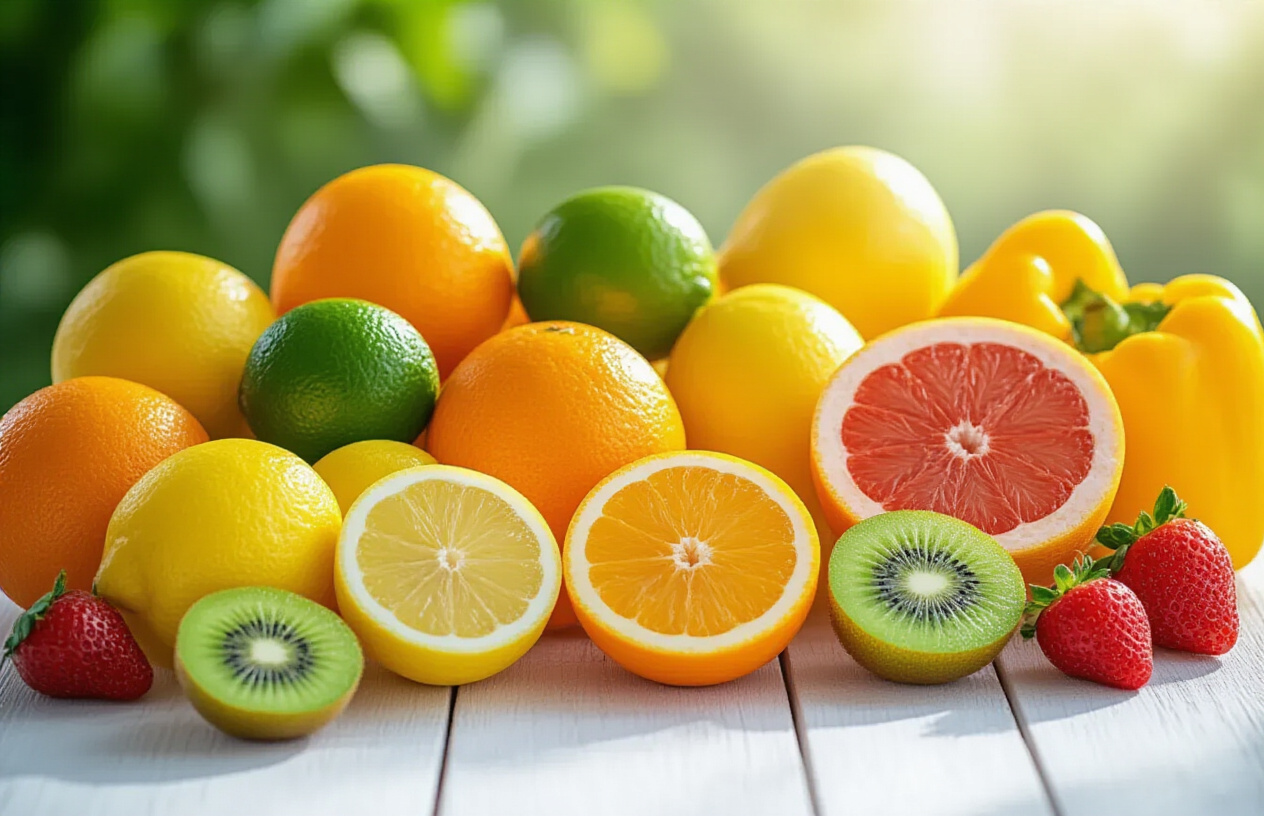
Oranges, Lemons, and Grapefruits for White Blood Cell Production
Citrus fruits like oranges, lemons, and grapefruits serve as excellent vitamin C foods for immunity, providing essential ascorbic acid that helps protect cells and maintain healthy immune function. As water-soluble vitamins that cannot be stored in the body, these immune boosting foods must be consumed daily to support white blood cell production and overall immune defense mechanisms.
Red Bell Peppers with Triple the Vitamin C of Oranges
Among natural immunity boosters, red bell peppers stand out as exceptional immune system foods, containing significantly higher vitamin C concentrations than traditional citrus options. These antioxidant rich foods provide concentrated ascorbic acid that supports tissue growth, repair, and wound healing while fighting free radicals that may compromise immune function and overall health.
Kiwi and Papaya as Nutrient-Dense Immune Boosters
Kiwi and papaya represent powerful healthy foods for immunity, delivering substantial vitamin C content alongside other immune supporting nutrients. These fruits provide essential ascorbic acid needed for maintaining healthy skin, blood vessels, and cartilage while supporting the body’s natural defense systems through their concentrated antioxidant properties and nutrient density.
Antioxidant-Rich Vegetables That Fight Infection
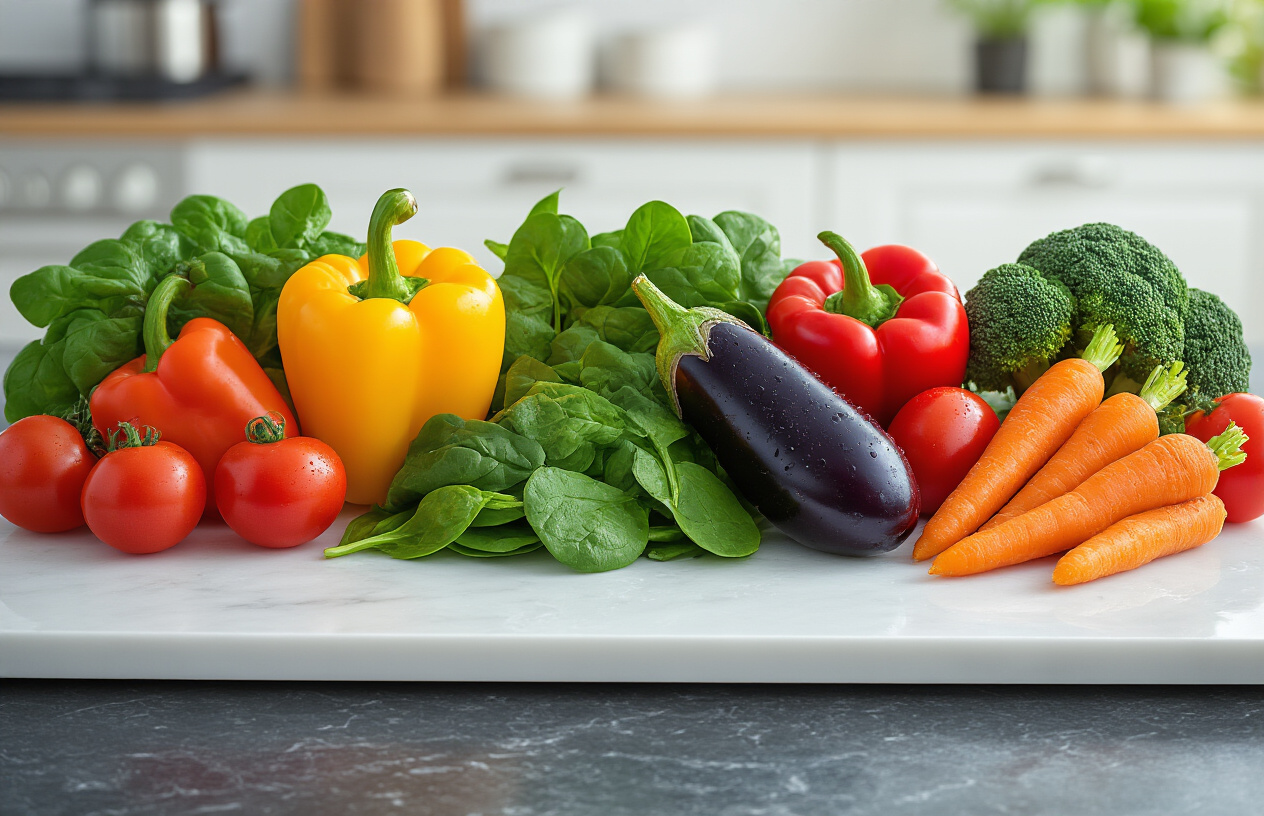
Dark Leafy Greens Like Spinach and Kale for Beta Carotene
Dark leafy green vegetables including spinach and kale serve as powerful natural immunity boosters, packed with beta-carotene and essential antioxidant rich foods. These immune system foods contain high concentrations of vitamin C and carotenoids, which your body converts to vitamin A for enhanced immune function. The beta-carotene in these greens acts as a potent antioxidant, neutralizing harmful free radicals while supporting cellular immunity through anti-inflammatory mechanisms.
Broccoli as a Vitamin A, C, and E Powerhouse
Broccoli stands out among immune boosting foods as a comprehensive nutrient powerhouse containing vitamins A, C, and E alongside unique bioactive compounds like sulforaphane. This cruciferous vegetable provides exceptional antioxidant and anti-inflammatory support, helping reduce inflammation while supporting natural detoxification processes. The combination of carotenoids and flavonoids in broccoli makes it one of the most effective foods that boost immunity naturally through multiple cellular pathways.
Brightly Colored Vegetables for Maximum Nutrient Density
Colorful vegetables derive their vibrant hues from carotenoids, making them exceptional anti inflammatory foods for immune support. Red, yellow, and orange vegetables typically contain higher concentrations of vitamins A and C, while green varieties provide abundant vitamin K and additional immune supporting nutrients. Research indicates that the more colorful your produce selection, the greater the antioxidant content, making diverse, brightly colored vegetables essential healthy foods for immunity that maximize nutrient density and natural immunity boosters.
Protein Sources That Strengthen Immune Response
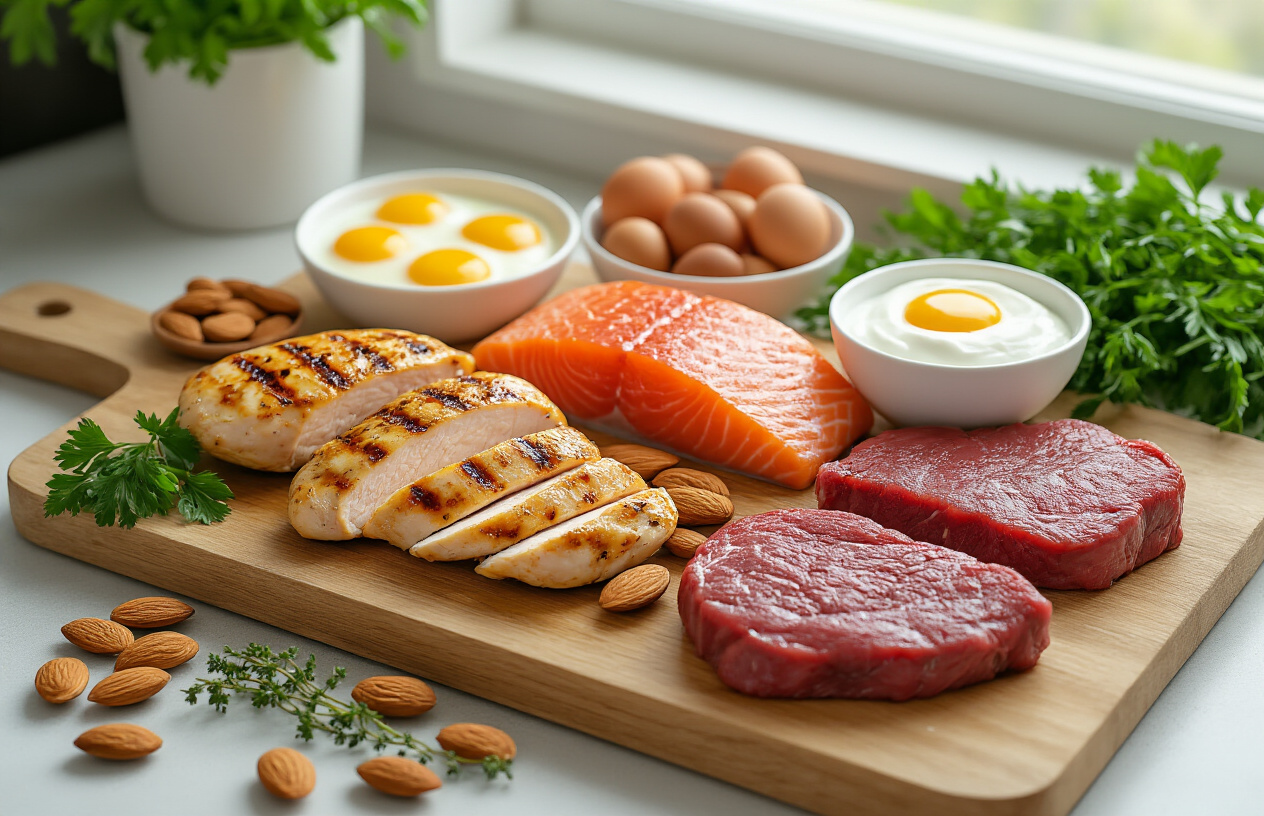
Poultry for Vitamin B6 and Zinc Content
Poultry stands out as an exceptional immune system food, providing zinc-dependent enzymes essential for proper immune function. Research shows that zinc deficiency has been directly linked with immune dysfunction, making poultry a vital protein source that strengthens immune response through its high zinc content and complete amino acid profile.
Shellfish Rich in Immune-Supporting Zinc
Now that we’ve covered poultry, shellfish emerges as another powerful natural immunity booster. These seafood options contain abundant zinc, which supports the formation of zinc-dependent enzymes crucial for immune system function. The high protein content in shellfish provides specific amino acids essential for T-cell function, the protective cells that defend against pathogens.
Fish Oil and Omega-3 Fatty Acids for White Blood Cell Activity
With protein sources established, fish represents a unique category of immune supporting nutrients. Beyond providing high-quality protein with essential amino acids for T-cell protection, fish delivers concentrated nutrition that complements other immune boosting foods. The protein found in seafood works synergistically with other healthy foods for immunity to maintain optimal immune system performance.
Fermented Foods and Probiotics for Gut Health
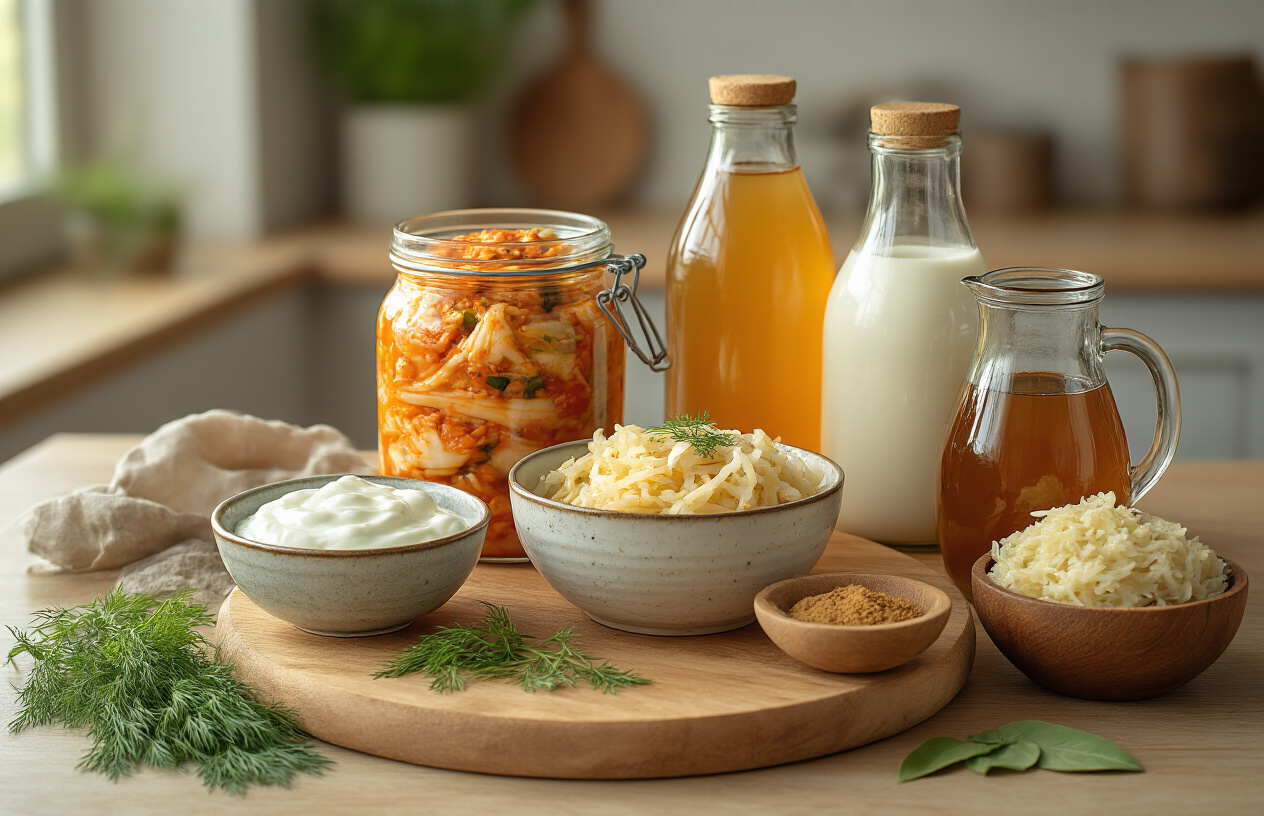
Fermented Foods and Probiotics for Gut Health
Now that we have explored various immune-supporting foods, let’s examine how fermented foods and probiotics enhance immunity through gut health optimization. Research demonstrates that probiotics are “live microorganisms which, when administered in adequate amounts, confer health benefits on the host.” These beneficial bacteria interact with intestinal immune cells and stimulate specific immune functions, including enhancing bioavailability of essential nutrients and reducing inflammatory responses.
Greek Yogurt with Live Active Cultures
Greek yogurt containing live active cultures provides concentrated probiotic strains that modulate immune responses through multiple mechanisms. Specific Lactobacillus strains, including L. acidophilus and L. casei, enhance IgA production and activate dendritic cells, macrophages, and T lymphocytes. These probiotics stimulate regulatory T cells to produce beneficial cytokines like IL-10 and TGF-β while upregulating immune receptors such as TLR2 and TLR4. Clinical studies show that Lactobacillus strains increase intestinal IgA+ cells and improve immune cell populations, strengthening mucosal immunity and enhancing vaccine responses.
Fermented Vegetables and Milk Products
Fermented vegetables and milk products deliver diverse probiotic strains that strengthen immune defense through gut microbiota modulation. Bifidobacterium species, including B. bifidum and B. longum, stimulate cytokine release and improve barrier function while promoting regulatory T cell differentiation. These probiotics secrete beneficial compounds including short-chain fatty acids, proteins, and peptides that interact with pattern recognition receptors. Multi-strain formulations demonstrate enhanced immunomodulatory effects, with studies showing reduced gut inflammation and improved protection against gastrointestinal infections and inflammatory bowel conditions.
Vitamin D Fortified Options for Enhanced Immunity
Vitamin D fortified fermented foods provide synergistic immune benefits by combining probiotic effects with vitamin D’s immunomodulatory properties. While probiotics enhance mucosal immunity through IgA production and T regulatory cell activation, vitamin D supports both innate and adaptive immune responses. This combination may optimize immune function more effectively than either component alone, though the reference content emphasizes that probiotic effects are strain-specific and depend on adequate amounts for conferring health benefits to the host immune system.
Immune-Boosting Spices and Anti-Inflammatory Foods
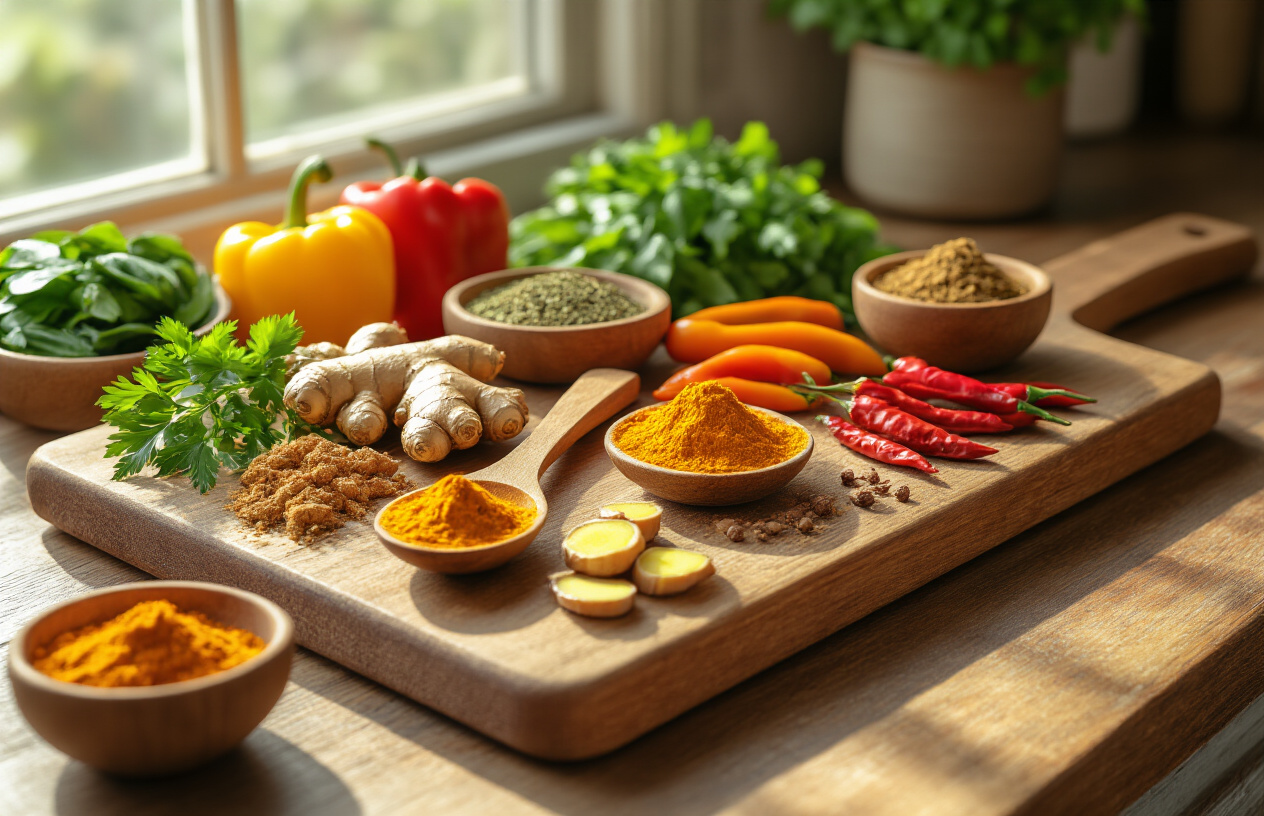
Garlic and Its Sulfur Compounds for Infection Fighting
Garlic stands as one of nature’s most potent anti-inflammatory foods, containing powerful sulfur compounds like allicin, diallyl disulfide, and S-allylcysteine that provide significant immune-boosting properties. Research analyzing over 830 participants found that garlic supplements significantly reduced C-reactive protein (CRP) levels, a key inflammatory marker in the body. These sulfur compounds help raise beneficial antioxidants like glutathione while regulating inflammation-promoting markers, making garlic an excellent addition to your immune-supporting diet.
Ginger for Reducing Inflammation and Nausea
With over 100 active compounds including gingerol and shogaol, ginger has been used for thousands of years to treat various health conditions. Studies involving 1,010 participants demonstrated that taking 1,000-3,000 mg of ginger daily for 4-12 weeks significantly reduced inflammatory markers compared to placebo groups. Research specifically on osteoarthritis patients showed ginger’s ability to reduce joint inflammation while increasing mobility, making it particularly valuable for immune system support and overall health maintenance.
Turmeric and Other Ancient Healing Spices
Turmeric contains over 300 active compounds, with curcumin being the primary anti-inflammatory agent that blocks NF-κB activation, a molecule that promotes inflammatory genes. Analysis of 15 studies involving 1,223 people showed curcumin supplementation significantly reduced inflammatory markers including interleukin 6 and C-reactive protein. Other ancient spices like cardamom and cinnamon also demonstrate remarkable anti-inflammatory properties, with cardamom raising antioxidant status by 90% and cinnamon reducing CRP levels when consumed regularly as part of an immune-supporting diet.
Nuts, Seeds, and Healthy Fats for Immune Support
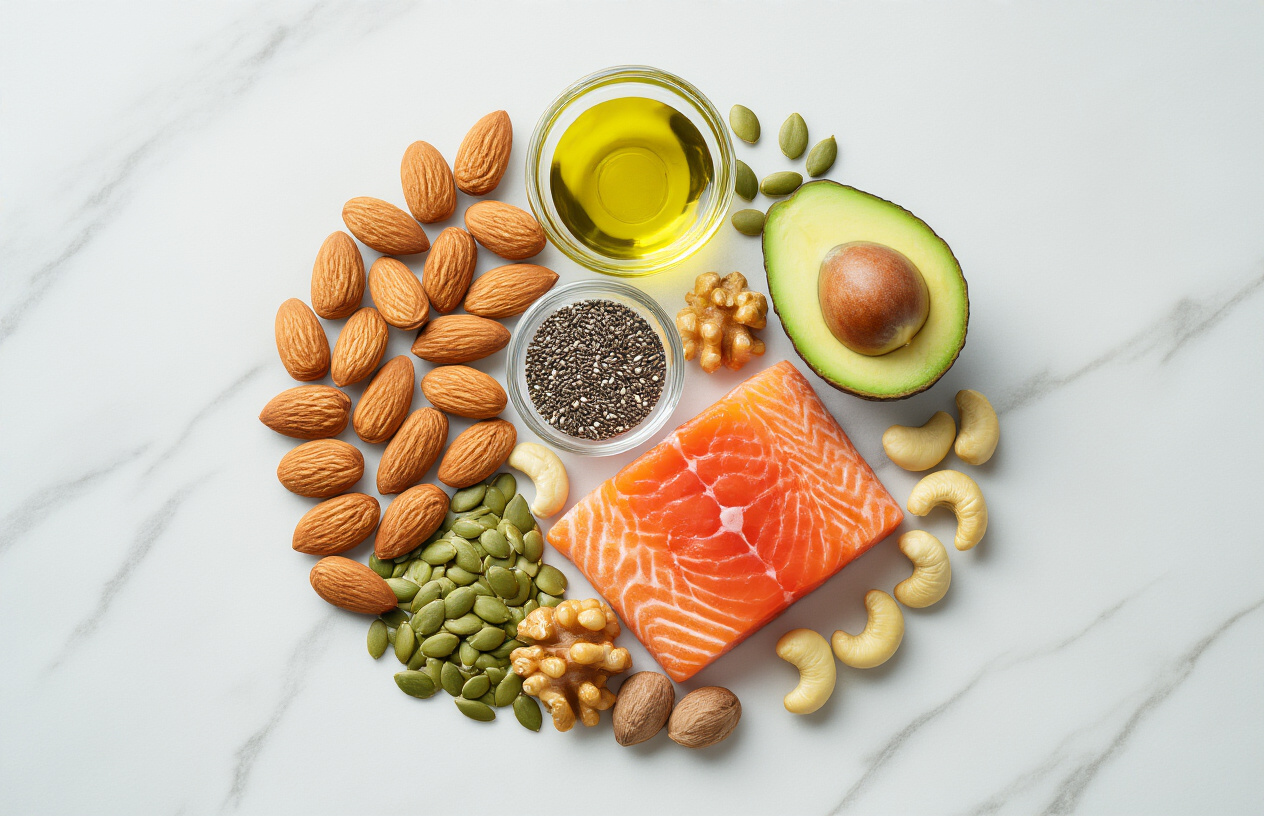
Nuts, Seeds, and Healthy Fats for Immune Support
Almonds and Vitamin E for Antioxidant Protection
Almonds stand out as powerful immune system allies, packed with vitamin E and other essential nutrients that help regulate and maintain your body’s natural defenses. These nutrient-dense nuts contain several vitamins and minerals including B-6, magnesium, phosphorous, and selenium that work together to support immune function. Add them to your salads or enjoy a handful as an energy-boosting healthy snack to harness their antioxidant properties.
Sunflower Seeds for Essential Vitamins and Minerals
Previously mentioned alongside nuts, sunflower seeds deliver a concentrated dose of immune-supporting nutrients that help your body fight infection. These small but mighty seeds contain the same beneficial vitamins and minerals found in nuts, including B-6, magnesium, phosphorous, and selenium. Their convenience makes them an excellent addition to your daily routine for maintaining optimal immune system function.
Olive Oil for Heart Health and Inflammation Reduction
With this foundation of nuts and seeds established, olive oil emerges as another crucial component for immune support. As a staple in the Mediterranean diet, this healthy fat benefits not only your heart and brain but also gives your immune system a significant boost through its remarkable ability to reduce inflammation throughout your body, creating an optimal environment for immune function.
Additional Immune-Supporting Foods and Beverages
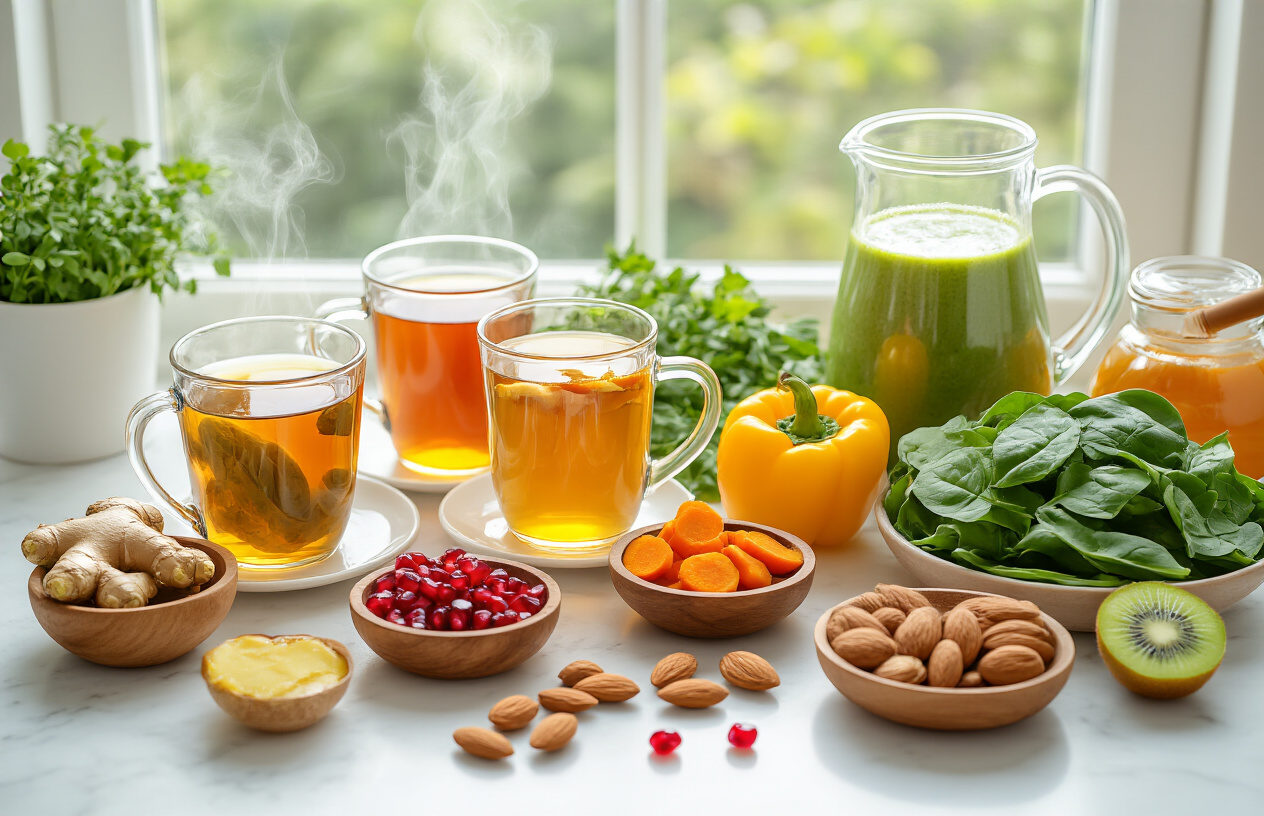
Green Tea and Its Powerful EGCG Antioxidants
Now that we’ve explored various immune-boosting foods, green tea stands out as a powerful beverage containing polyphenols, especially epigallocatechin-3-gallate (EGCG), that greatly enhance immune response through multiple mechanisms. These immune boosting foods compounds stimulate cellular immunity by promoting immune cell proliferation, activating T lymphocytes, and modulating inflammation through anti-inflammatory pathways while reducing oxidative stress and supporting beneficial gut bacteria like Lactobacillus for comprehensive immune system support.
Berries Packed with Vitamins and Antioxidants
While the reference content focuses primarily on green tea polyphenols rather than berries specifically, these antioxidant rich foods complement the immune-supporting benefits discussed throughout this natural immunity boosters guide by providing additional protective compounds.
Natural Sweeteners Like Honey for Added Benefits
Though honey isn’t detailed in the provided research, incorporating natural sweeteners alongside the previously mentioned immune supporting nutrients can enhance the palatability of green tea while maintaining the focus on foods that boost immunity naturally through scientifically-backed compounds like EGCG and other polyphenols.
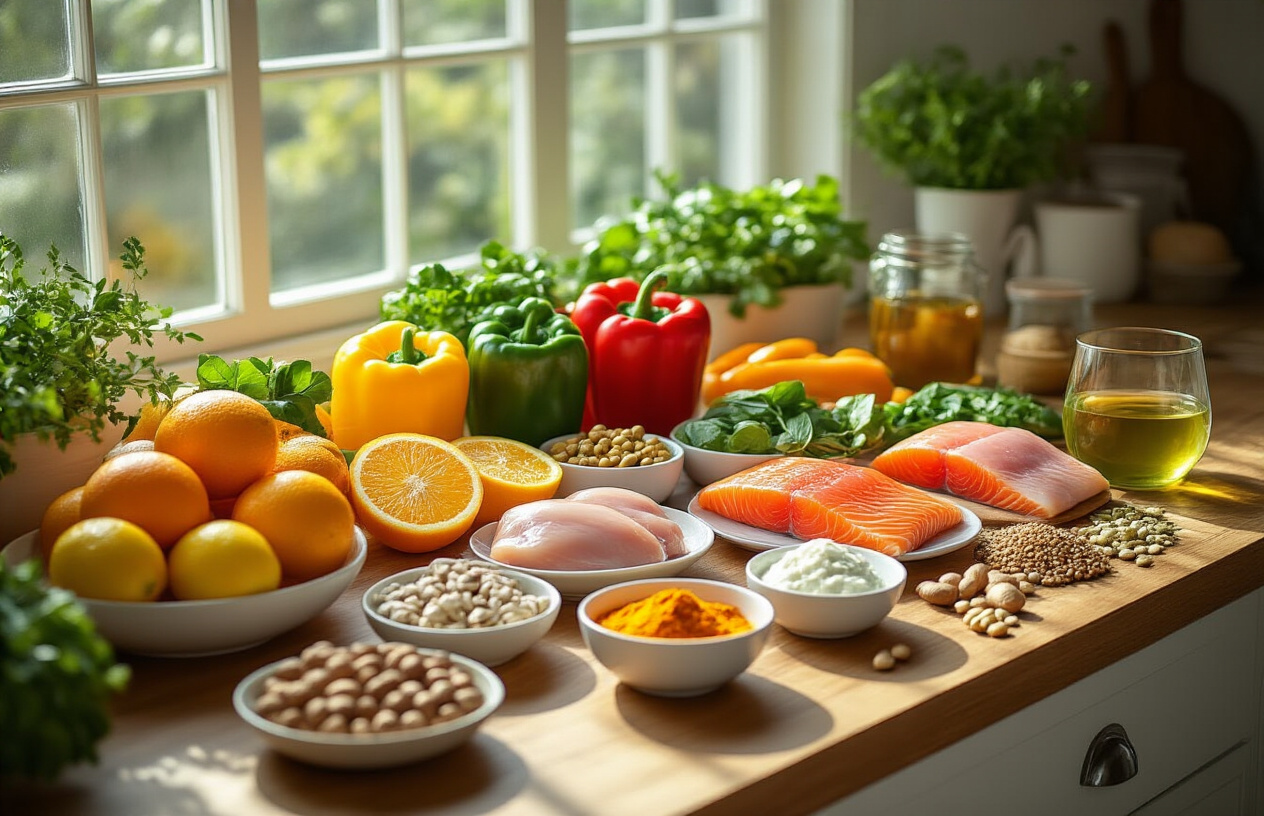
Building a strong immune system through nutrition is one of the most powerful tools at your disposal for maintaining optimal health. From vitamin C-rich citrus fruits and antioxidant-packed vegetables to immune-supporting proteins, fermented foods, and anti-inflammatory spices, the seven categories of foods outlined above provide your body with essential nutrients to fight infections and stay resilient. Nuts, seeds, and healthy fats further strengthen this nutritional foundation, while additional immune-boosting beverages and foods round out a comprehensive approach to wellness.
Remember that no single food can prevent illness or cure disease, but consistently incorporating these nutrient-dense options into a balanced diet can significantly support your body’s natural defense mechanisms. Combine these dietary choices with regular exercise, adequate sleep, stress management, and good hygiene practices for the most effective immune support. Start making small changes today by adding more of these immune-boosting foods to your meals – your body will thank you for the extra protection and vitality they provide.